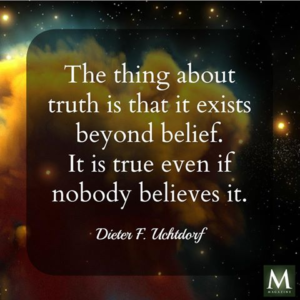My Truth?
I find myself cringing when I hear the phrase “speak my truth”.
Truth is something that exists – independent of any person. One cannot “own” truth, let alone define their “personal truth”. How can several people have different or conflicting truths and they all be true?
One can share their unique experience – maybe that is what they really mean? One can relate their particular perspective of something, which may be very different than mine. Psychotic people may be dealing with altered reality, but their perception does not change what is true.
Someone cannot create their own truth. And certainly no one should be able to force others to accept, validate or conform to a particular independently defined truth.
Perhaps this statement is just an outgrowth of the general societal trend of rejecting the idea of absolute truth. Truth has become relative to many. It is defined by changing societal trends and popular opinion. Many things that were considered true in the past are no longer considered true, not because they have changed or even because of new knowledge, but because people have decided they are no longer relevant. Maybe this is because it would be inconvenient to have to conform to those truths.
New “truths” have emerged, based more on theories or prevailing beliefs, than on actual fact. These may be more accepted because they are what people want to believe, or what affirms their behavior or thinking.

Absolute Truth
I recently read an opinion piece about math which related that many people hate math “because there is only one right answer.” Math is absolute truth. You can’t change 2 + 2 to equal 5 just because that is “your truth.” It will always equal 4.
Do people hate the idea of absolute truth because there is only one right answer? If they don’t like that right answer, they look for another “truth” that agrees with their thinking, or will validate their behavior?
I personally feel more secure in knowing that there is one right answer. There is comfort in the constancy. We can rely on truths that won’t change.
Methods of Learning Truth
With the math article, it was pointed out that there may be different methods to come to the one right answer. Some methods may be easier for particular people to learn. To me, math is like a foreign language. I understand the basics like I have learned some vocabulary of other languages, but I don’t have enough education or experience to be fluent. Math is certainly not my native tongue. But that does not mean I can’t learn if I put forth the effort.
Most people would agree that math and science involve unchanging truths. Most would also agree that understanding of scientific truth has changed over time. Truth wasn’t different when people believed the world was flat. The universe wasn’t smaller before telescopes brought more into our view. But many in our enlightened age, fail to see that their understanding of scientific or other truths may yet be lacking. There are truths which we do not fully understand.
With moral truths, however, people are less likely to accept the idea of absolute truth. They feel that these are arbitrary rules, relate only to more “primitive times” or are subject to the changing whims of society. Moral “truths” have become to them more like “popular trends.”
To return to the idea of different methods. There may be a number of effective methods to understand math. There are certain methods which are used to learn scientific truths. Understanding moral or spiritual truth requires very different methods. It is important to understand this and not try to learn truth through methods designed for other things.
Testifying of Truth
Witnesses in a courtroom testify to facts that they know to be true. They “know” these truths because of what they have experienced – seen, heard, or done. Other “expert witnesses” may know these things because of what they have learned through study, observation, experimentation or experience. The process or method of learning is often critical.
One can also testify of spiritual truths which they have come to know. How they have come to know can also be significant. We can share our personal experiences. Others who have not had similar experiences may not understand. Some may seek out similar experiences. We can share what we have learned through study. But knowing truth is more that repeating back what someone else has said. A true testimony of truth requires going to the source of truth. That sure knowledge of truth comes only through the spirit.
Understanding of truth may deepen through time and experience. It can also be dimmed, doubted or forgotten if neglected. But the truth remains the truth.
